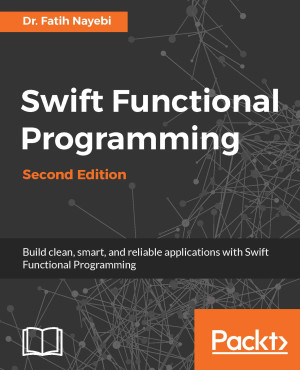Swift Functional Programming - Second Edition
RM 83.00
ISBN:
9781787283459
Categories:
Engineering & IT
File Size
3.08 MB
Format
epub
Language
English
Release Year
2017
Favorite (0)
Author
Dr. Fatih NayebiSynopsis
Key FeaturesWritten for the latest version of Swift, this is a comprehensive guide that introduces iOS, Web and macOS developers to the all-new world of functional programming that has so far been alien to themGet familiar with using functional programming alongside existing OOP techniques so you can get the best of both worlds and develop clean, robust, and scalable codeDevelop a case study on example backend API with Swift and Vapor Framework and an iOS application with Functional Programming, Protocol-Oriented Programming, Functional Reactive Programming, and Object-Oriented Programming techniquesBook DescriptionSwift is a multi-paradigm programming language enabling you to tackle different problems in various ways. Understanding each paradigm and knowing when and how to utilize and combine them can lead to a better code base. Functional programming (FP) is an important paradigm that empowers us with declarative development and makes applications more suitable for testing, as well as performant and elegant. This book aims to simplify the FP paradigms, making them easily understandable and usable, by showing you how to solve many of your day-to-day development problems using Swift FP.It starts with the basics of FP, and you will go through all the core concepts of Swift and the building blocks of FP. You will also go through important aspects, such as function composition and currying, custom operator definition, monads, functors, applicative functors,memoization, lenses, algebraic data types, type erasure, functional data structures, functional reactive programming (FRP), and protocol-oriented programming(POP). You will then learn to combine those techniques to develop a fully functional iOS application from scratchWhat you will learnUnderstand what functional programming is and why it mattersUnderstand custom operators, function composition, currying, recursion, and memoizationExplore algebraic data types, pattern matching, generics, associated type protocols, and type erasureGet acquainted with higher-kinded types and higher-order functions using practical examplesGet familiar with functional and non-functional ways to deal with optionalsMake use of functional data structures such as semigroup, monoid, binary search tree, linked list, stack, and lazy listUnderstand the importance of immutability, copy constructors, and lensesDevelop a backend API with VaporCreate an iOS app by combining FP, OOP, FRP, and POP paradigmsAbout the AuthorDr. Fatih Nayebi has more than 15 years of industry experience in software engineering and architecture in various fields. He has developed numerous applications with Visual Basic, C++, C#, Java, MATLAB, Python, Objective-C, and Swift. He has been designing and developing enterprise and consumer iOS applications since the release of first iOS SDK. He is also an enthusiastic Node, Scala, and Haskell developer.Aside from industry, Fatih earned his Ph.D. degree in software engineering from Ecole de technologie superieure, Universite du Quebec by researching on Mobile Human-Computer Interaction, Software Engineering, and Machine Learning.His specialties include applied predictive and optimization models, human-computer interaction, functional programming, machine learning, and mobile application architecture and development.Fatih currently works as a Director, Consulting at CGI Group Inc, Montreal, and continues to his academic research and publications as a postdoctoral researcher at Ecole de technologie superieure.You can find him talking on Swift and Functional Programming at meetups such as http://www.meetup.com/swift-mtl/, on GitHub at https://github.com/conqueror, on Twitter as @thefatih, and on Instagram as @thefatih.Table of ContentsGetting Started with Functional Programming in SwiftFunctions and ClosuresTypes and Type CastingEnumerations and Pattern MatchingGenerics and Associated Type ProtocolsMap, Filter, and ReduceDealing with OptionalsFunctional Data StructuresImportance of ImmutabilityBest of Both Worlds and Combining FP Paradigms with OOPCase Study - Developing an iOS Application with FP and OOP Paradigms

